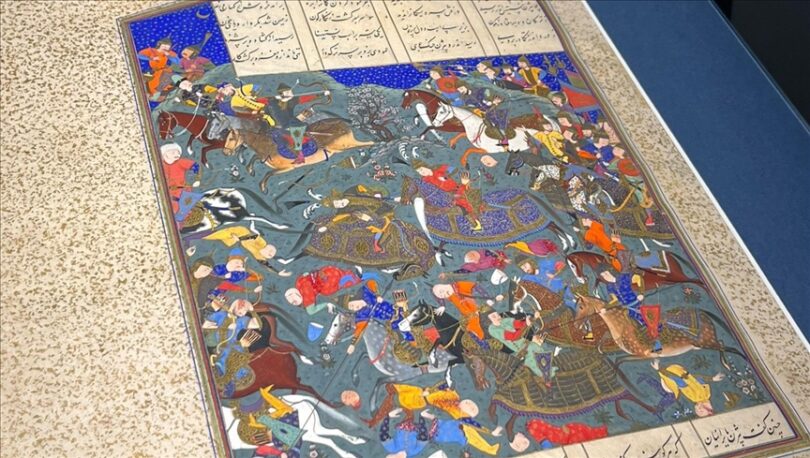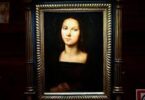LONDON (AA): Sotheby’s has once again attracted attention with a multimillion-pound sale of some of the rarest and most valuable works of Islamic art.
The world-renowned auction house in London held bidding on April 26, which featured pieces that spanned from the first centuries of Islam to the early 19th century.
Benedict Carter, the head of Sotheby’s Islamic and Indian art department, told Anadolu that the auction encompasses different types of material culture from across the Islamic world from Spain on the one hand, to South Asia on the other, running through the entire Middle East, North Africa, Middle East, Turkey, Iran, India, and South Asia.
He said the sale had about 135 pieces.
“Among the highlights are the two swords. They’re both Indian, one from the 17th century, the other from the 18th century,” he said.
“The top line is actually a single illustrated folio from probably the greatest illustrated Persian manuscripts ever produced by Shahnameh of Shah Tahmasp. That is really one of the rarest sort of single-leaf illustrations that you would find left on the market today,” he said.
The highest-priced item sold was a folio from Shahnameh of Shah Tahmasp, which depicts a battle scene from the Iran-Turan War, which sold for £4.9 million ($6.1 million.)
The folio was a gift from Shah Tahmasp, the son of Shah Ismail, to Ottoman Sultan Selim II in 1568.
The Shahnameh manuscript made for Shah Tahmasp of Persia (1514-76) is universally acknowledged as one of the supreme illustrated manuscripts of any period or culture and is among the greatest works of art in the world.
“On top of that, there was important Quranic material, including single leaves from the early Islamic period from the eighth to ninth centuries, as well as Qurans from Ottoman Türkiye in the 17th and 18th centuries, as well as India and Iran,” said Carter.
An exceptional 17th-century Ottoman dagger with a gold inlaid blade was sold for £254,000.
There was also decorative art from the Islamic world — principally the Ottoman period from the 18th and 19th centuries.
An Iznik “Golden Horn” vase from around 1530-1540 was sold for nearly £100,000 ($126,000).
The auction brought in £12. 5 million ($15.7 million) with 84 lots sold, including textiles, ceramics, metalwork, and painting.
According to Carter, it is difficult to know who is really going to come out and keep bidding on the most important things.
“There are always a lot of surprises whether there are important private buyers as well as museum buyers from both the Middle East and the US, and Europe. I’d say that in general, though, the pattern over the last five or six years has been that the best pieces in the market, that sort of masterpieces have always been the most sought after,” he said.
He said these items do seem to be getting more expensive because there is more value attached to their rarity than ever.
“So, there’s definitely a sort of premium attached to the items of the most beautiful and the best condition with the most distinguished history,” he added.
Islamic art has a long and rich history, stretching back more than 1,400 years from the geometric patterns of early Islamic architecture to the intricate calligraphy of Quranic manuscripts.
In recent years, interest in Islamic art has grown significantly, driven in part by the increasing wealth and interest of collectors from the Middle East and Asia.
Auctions like the one in London provide an opportunity for collectors and enthusiasts to appreciate and acquire unique and valuable works of art from the Islamic world.







